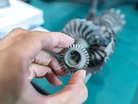Additive manufacturing technology & industrial machinery

When it comes to the manufacture of industrial equipment – be it scientific instruments, factory equipment or power tools – many different intricate parts will be needed to ensure that the product functions as intended.
What’s more, there is a clear and common need for those parts, however complex they may be, to deliver the robustness, consistency, accuracy, and repeatability to faithfully uphold the performance expectations and functionality of the product. And the challenge for industrial manufacturers doesn’t end there, as the need for such parts to be produced both timely and cost-effectively is just as critical.
But how many ‘intricate parts’ does the average industrial manufacturer actually produce? Well, it ranges from hundreds to thousands of units annually. While that may seem substantial, by mass production standards it’s pretty small. At these volumes, if parts are produced via traditional manufacturing methods, the required tooling will mean long lead times and high costs – two things that can seriously damage any manufacturing business.
–For part volumes of this size, no matter how complex the part design is, additive manufacturing (AM) offers the solution. Across the globe today, manufacturers are significantly reducing production costs and accelerating time to market for parts volumes as low as a single unit and as high as several thousand using AM. And, thanks to the fundamental versatility of AM, each individual part can be customized and optimized, providing even further cost reductions.
Reaching new frontiers in additive manufacturing
Stratasys’ industrial-grade SAF™ technology, a new form of powder-based AM technology, takes these capabilities one step further.
Using a single pass print-and-fuse process, industrial equipment manufacturers have the ability to produce robust end-use parts with the level of control, accuracy and repeatability expected from injection molding. For small parts with complex geometries in particular, where injection molding often struggles, SAF can be leveraged by manufacturers to 3D print tens of thousands of consistent functional production parts. When you add to the mix a cost-per-part that frequently supersedes injection molding or CNC machining, the business case for AM use by industrial machine manufacturers is very compelling.
For example, as part of our own in-house testing, we determined that when producing up to 13,000 impeller parts per year with 3D printers based on SAF technology, AM was significantly cheaper than injection molding. What’s more, the go-to-market time was reduced from over 12 weeks to just three days. For a manufacturing business looking to optimize its production operations, these are transformative savings.
The power of additive manufacturing technology
As well as being able to compete with traditional manufacturing methods on cost and delivery times, AM parts and materials offer an impressive profile when it comes to accuracy too. A great recent example of this is in the assessment of the geometric accuracy of an electric connector 3D printed with SAF technology. Our tests concluded that, when designed well and nested effectively, some of the features on the connector achieved 6-sigma level production consistency (CPK value of 2.0 or above), and an average Z UTS of 41.2 MPa (5982 psi) – essentially with no compromise to mechanical performance.
So, where does this leave us? When should industrial machine manufacturers consider SAF technology for volume production? For us, the sweet spot certainly is for applications where high volumes of small or complex parts are required. This is where SAF can really add value, and where we are already seeing it provide some industrial machine manufacturers with a revenue-generating competitive edge.
- The University Manufacturing Circuit Boards from LeavesSustainability & ESG
- Schneider Electric's Commitment to Sustainable ManufacturingSustainability & ESG
- Lenovo & Saudi Alat Building Green Manufacturing FacilitySustainability & ESG
- Nissan Brings Biodiversity to the Factory through RewildingSustainability & ESG

